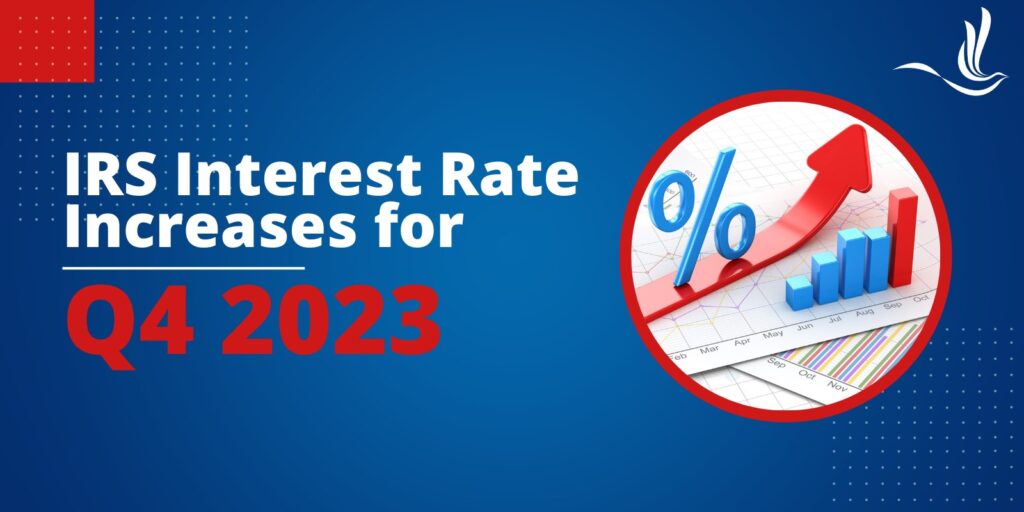IRS Interest Rate Increases for Q4 2023

As the fourth quarter of 2023 unfolds, taxpayers across the U.S are faced with an important development – an increase in IRS interest rates. The IRS periodically adjusts its interest rates, and these changes can have significant implications for individuals and businesses. In this article, we will explore the reasons behind the IRS interest rate increases, how they impact taxpayers, and what individuals and businesses can do to navigate this change effectively.
About IRS Interest Rates
The IRS sets interest rates to determine the amount of interest that accrues on unpaid taxes, late payments, and overpayments. Interest rates can vary by quarter. They are based on the federal short-term rate plus an additional 0.5 to 5 points, depending on the type of underpayment or overpayment. It’s also crucial to note that IRS interest rates compound daily. This means that the interest charged is based on the previous day’s tax balance, plus the interest.
What are the new IRS interest rates for Q4 2023?
The interest rates imposed by the IRS as of October 1, 2023, are as follows:
- Individual Tax Underpayment: 8%
- Large Corporation Tax Underpayment: 10%
- Individual Tax Overpayment: 8%
- Large Corporation Tax Overpayment: 7%
- Portion of Large Corporation Tax Overpayment Exceeding $10,000: 5.5%
When does underpayment interest begin?
The IRS begins charging interest on balances owed beginning on the due date. Your balance will continue to accrue interest until it is paid in full. It’s important to note that tax extensions are not extensions to pay – only to file. This means that if you file for an extension in April, you will have until October to file your taxes. However, your balance will continue to accrue interest until it’s paid in full. That said, if you don’t file your taxes or don’t pay your balance, you’ll also be subject to failure-to-file or failure-to-pay penalties. You can also be penalized for underpaying estimated tax, making a payment with insufficient funds, or failing to file an accurate return.
When does overpayment interest begin?
Overpayments happen when you paid the IRS more than you owed in taxes. In these cases, the IRS will owe you a tax refund. The IRS generally has 45 days to issue your refund. If they exceed that time frame, they will typically pay overpayment interest. The interest will begin from the later of the following events:
- The tax deadline
- The date your late tax return was received by the IRS
- The date the IRS received your tax return in a sufficient format
- The date a payment was made
Impact on Taxpayers
The Q4 2023 increase in IRS interest rates will have several implications for taxpayers:
- Increased Costs: Taxpayers who owe money to the IRS will face higher interest costs on unpaid taxes, potentially making it more expensive to resolve their tax liabilities.
- More Attractive Savings: On the flip side, taxpayers who are owed refunds or have overpaid their taxes may benefit from higher interest rates on their refunds, making it more attractive to save or invest their tax refunds.
- Prompt Payment Encouragement: The higher interest rates can serve as an incentive for taxpayers to pay their taxes promptly, as delaying payments can lead to accruing additional interest charges.
What You Can Do
In light of the IRS interest rate increases in Q4 2023, there are steps that individuals and businesses can take to navigate this change effectively.
- Pay Taxes Promptly: To avoid higher interest charges on unpaid taxes, make sure to pay your tax liabilities on time.
- Apply for a Payment Plan: If you cannot afford to pay your balance in full when it’s due, you should contact the IRS immediately to set up a payment plan. Doing so can help lower some of your penalties.
- Request Penalty Relief: There are a few instances where you may be able to get your penalties waived, such as being a first-time offender, acting with reasonable cause, or other statutory exceptions.
- File an Amended Return: You may be able to reduce your tax balance or penalties by filing an amended return.
Tax Help for Those with Tax Balances
Tax laws can be complex, and it’s advisable to consult a tax professional who can provide guidance on tax planning and managing your financial obligations efficiently. It’s essential for taxpayers to stay informed, plan wisely, and consider professional advice to navigate these changes in IRS interest rates effectively. By doing so, individuals and businesses can manage their financial responsibilities in an ever-evolving economic environment. Optima Tax Relief is the nation’s leading tax resolution firm with over a decade of experience helping taxpayers with tough tax situations.
If You Need Tax Help, Contact Us Today for a Free Consultation